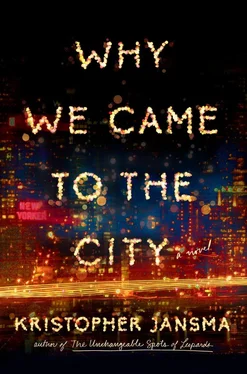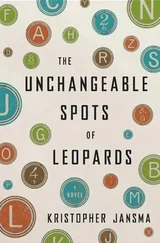The Mariani Prize committee had particularly loved the “deft handling of pop-cultural allusions” (fearing litigation, Jacob had referred to Jordan throughout only as “Number Twenty-three”) and his “unblinking insight into modern racial discourse” (Jacob had never quite figured out what that meant). Among the other accolades they’d heaped upon the poem were that it was “unabashedly obscene” and that he was “a man’s poet like none since Bukowski”—misguided sentiments that made Jacob retch. Four years later these praises were braided together into the strands of a noose that he’d cinched around his own neck.
Reading Shitstorm sickened him now. He’d been angry as hell those two weeks when it had poured out of him. At the time he thought it honest, full of pure rage. A mirror held up to the sickness of the world. But as time had passed, he had come to realize that under all the sly references and ballsy profanity, his poem had only one monotonous undertone — the same shrill buzzing that had been in his head that whole week, in the wake of his uncle Miles. Beneath all the rest was only one sound. It went fuck you and fuck you and fuck you and fuck you and fuck you and fuck you. And that was all.
Jacob tried to shake all this from his head as people poured onto the train at Union Square. The car was crowded, and the swell of Brooklyn-bound bodies began to prick at something inside him. He felt hot and sick and shaky. He felt the worm begin to break, but with his eyes squeezed tight, he thought he might make it. He was so close. Just two quick stops, and he’d be free. He would coax it all out at last.
“Ladies and gentlemen,” came a quaking voice behind him.
Not now , Jacob begged, keeping his eyes shut tight. But he could smell unwashed skin. He could feel hot breath passing his ear.
“Ladies and gentlemen, I’m sorry to bother you,” the voice continued. “I need some money so that I can get something to eat. I’m really sorry to bother you, but I’m very hungry.”
It wasn’t the usual affectless mumbling that Jacob and most city residents had adjusted their internal dials to ignore. It wasn’t the drone he’d heard a million times before, on sidewalks and street corners and in subway cars just like this. This man sounded really awful. This man sounded dead already.
“Ladies and gentlemen, I need your help. I don’t know what I’m going to do. I swear to God, I’m really scared, everybody. I really don’t know what I’m going to do.”
Somehow Jacob felt the ugly twinge in the man’s tone. It wasn’t “I don’t know what I’m going to do to survive” but “I don’t know what I’m going to do next.” It wasn’t desperation to live; it was a fear of knowing the only options he had left. These weren’t the pleadings of a man just trying to make it to tomorrow. They were the quaking last words of a man headed for the nearest bridge unless he got a dollar. But Jacob’s wallet was empty. He didn’t even have a quarter. He’d spent his last ten on a bottle of cheap wine, which he and Pete had barely touched, and which Pete had emptied down the drain last night before sending the bottle shuddering down the trash chute. Jacob winced. If all he’d had were a hundred-dollar bill, he’d have given it to the man just to make him be quiet.
“Please,” the man begged, “I swear to God I don’t know what I’m going to do.”
The doors opened at Third Avenue and Jacob moved toward the platform — it wasn’t his stop, but he didn’t care. He’d walk across the state to get away. As he got out onto the platform, he heard the doors closing behind him, and momentarily seized by some perverse imp, he turned to get a look at the man. His dark skin was powdered with some strange white grime. Jacob looked into his eyes. The worm snapped. The train pulled away from the station and left Jacob there. The lump in his throat had sunk deep down into his guts now, and he was sure it was never coming out.
4
The call had come just after lunch, thank God, as Irene knew there’d have been no keeping Sara from joining her for the appointment if she’d known about it. The gallery was closed for two weeks heading into the holidays, and so Irene had been wandering around the Village, getting lost in the nexus of Bleecker and Christopher Streets and Sixth and Seventh Avenues, ostensibly doing some holiday shopping. She’d already found nice leather boots for Sara, though Irene wasn’t going to tell her they had been purchased at the Pleasure Chest. At her favorite vintage store, Mel’s Secondhand Shop, she found, for George, a thermos with Einstein’s face on it that said REALITY IS MERELY AN ILLUSION, so that his coffee would stay warm on his way out to the observatory. She thought about William when she saw a scarf like the one Bob Dylan wore on the cover of Blonde on Blonde that she could see him in, that is, if she ever actually did see him again.
Sara had gone on and on about William at lunch, and about fate and how seeing him again after so long meant that it was. Fate. Irene said she preferred to make her own fate, but secretly she was glad that, in this case, the forces of fate, via Sara, would certainly throw her back into his path again soon. So she got the scarf and had them wrap it. Heart beating heavier then, she went to the back where they had a lot of old books and found an illustrated book of Italian fairy tales for Jacob. They’d first met in an Italian class that she’d been sitting in on and that he’d failed spectacularly.
It was just after this, having wandered into a pet shop down the street, that the woman called from Dr. Atoosa Zarrani’s office at Mount Sinai Hospital to say that the results were in and the doctor could see her that afternoon to go over them.
“Unless you’re busy? Are you at the zoo? In this cold?”
“Oh no,” Irene had answered. “I’m in a pet shop. I was thinking about buying a bird.”
The woman had laughed. “Birds can be a lot of work. I have two sulfur-crested cockatoos at home.”
“Is that a good kind?”
“I wouldn’t recommend them to a beginner.”
“It’s just that I have this beautiful bird cage,” Irene confessed. “It was there when I moved into my apartment. I guess the last tenant left it behind. Anyway I just keep my jewelry and things in it, but sometimes I think to myself — I don’t know, maybe I’d like having a pet.”
“Well,” the woman had said, “you think about it. And if you need some time, I’m sure we can find you an appointment tomorrow.”
Irene had taken this as a good sign. Surely if there was something wrong, the woman would have orders to get her there pronto. Plus, the woman wouldn’t be telling her to buy a bird if she thought she was dying. That’d be irresponsible. So nothing to worry about.
And that was how Irene came to find herself, a few hours later, sitting in a little room at Mount Sinai Hospital with bare walls and a table bolted to the floor. Her shopping bags were at her feet, and she tried to keep the one with the purple silhouette of a dominatrix with a cracking whip facing the wall. To kill time, she flipped through the book of Italian fairy tales and thought happily about what type of bird she might get, until she looked up to see a tall Persian woman in a lab coat coming into the room.
“Richmond? Irene?”
They shook hands, and the doctor sat down and began leafing through the report she was carrying. Irene recognized the jagged, illegible signature of Dr. Von Hatter at Park Avenue Pathology, where she’d gone for the biopsy. Irene noticed the clear, commanding letters beneath it: DR. ATOOSA ZARRANI. Not. Messing. Around.
“You came by yourself?” the doctor said, looking around as if someone were hiding.
Читать дальше












